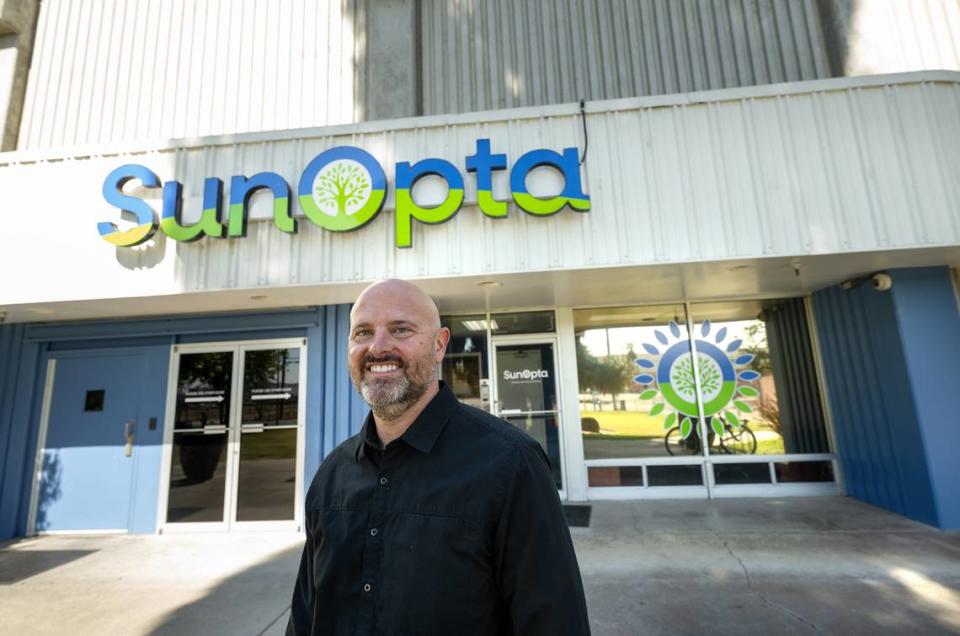Modesto plant expands its oat milk output once again. Why this product is so popular
SunOpta has expanded its oat milk line in Modesto again, adding 17 employees to the 200 already there.
The company also makes almond, soy and coconut milk at its Mariposa Road plant, along with chicken and other broths and stocks. It has thrived as people seek alternatives to cow milk for health or ethical reasons.
“I think the consumers are better educated,” senior plant manager Joe Gerhardt said Tuesday, July 9. “They have more options to be able to choose food that works for them.”
Gerhardt provided a plant tour for The Modesto Bee but declined to say just how the milks are made. A news release said “proprietary enzymatic processes” break down the oats and other ingredients in an array of tanks, pipes and other equipment.

Most of the volume goes to outside retail brands and other buyers, which SunOpta does not disclose. It has three labels of its own: The Sown oat-based coffee creamer is at Sprouts Farmers Market in Modesto, among other stores. West Life soy milk is at Sprouts, Walmart and some other grocers. Even more stores carry almond, soy, coconut and rice milk under the Dream brand.
SunOpta also sells its products on Amazon. The cartons can be kept at room temperature and then chilled before drinking or pouring onto cereal and the like.
Most of the products are organic. That means no synthetic fertilizers or pesticides where the oats and other crops are grown.

Modesto plant had been fruit cannery
SunOpta has its headquarters and a plant in Minnesota and other production in Pennsylvania and Texas. It employs about 1,400 people in all. The company makes fruit snacks, teas and a few other items besides plant-based milk.
The Modesto operation dates to 2009. The site had been part of a fruit cannery owned by Tri-Valley Growers, which went bankrupt in 2000. SunOpta first expanded the oat milk line in 2021, adding 10 jobs.
The manufacturer turns out liquid and dried “oatbase” for sale to other companies. It can end up in yogurt, ice cream and other dairy alternatives, as well as a substitute for wheat flour.
“It makes the best pancakes I’ve ever tasted,” Gerhardt said over the clatter of machinery at the plant.
Modesto expansion cost $26 million
The release said the latest expansion cost about $26 million and boosted oat milk volume by about 60%. It takes up 167,684 square feet within the current building footprint.
The company runs four shifts, around the clock every day. It employs production line workers, mechanics, laboratory technicians, engineers and others.
Plant-based milk producers start with oats or other basic raw materials, then add ingredients to enhance flavor, texture and nutrition.
Industry sales totaled about $3.12 billion in the United States last year, according to the Good Food Institute. Blue Diamond Growers is a key player with its Almond Breeze milk, made in Turlock and Sacramento.
Cow milk remains a far bigger industry. The nation’s dairy farmers sold about $45.9 billion worth last year, the U.S Department of Agriculture reported.

$20 billion global market now
The SunOpta release said the global market for plant-based milk could go from about $20 billion this year to $45 billion by 2034.
“Through this significant investment in Modesto to produce more oatbase,” CEO Brian Kocher said, “we’re well positioned to meet the increasing market demand for plant-based milk and other oat-based products.”
The Modesto site generates zero waste, Gerhardt said. Water and heat are recirculated during the processing. Leftover organic matter goes to Central Valley Ag Group, which turns green waste into nutrients for crops and livestock.

